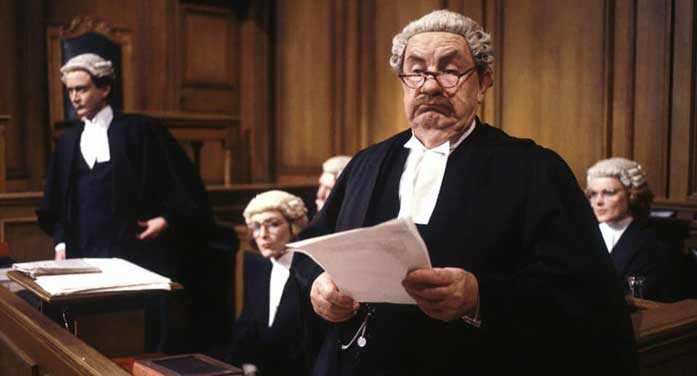 Thanksgiving in Canada is a wonderful, relaxing time. Turkey dinner with family. Football games and baseball playoffs. Listening to music. Catching up on reading.
Thanksgiving in Canada is a wonderful, relaxing time. Turkey dinner with family. Football games and baseball playoffs. Listening to music. Catching up on reading.
How could you ask for anything better?
As it happens, I can add one cherry on top of the proverbial sundae. I was able to go through my DVD collection of John Mortimer’s Rumpole of the Bailey.
While most of my reading interests are non-fiction, I have a soft spot for British-based mystery novels and detective fiction. Mortimer’s body of work would be classified as legal/courtroom drama. He was trained as a barrister and would later “take the silk” and become a Queen’s Counsel (QC). There were more than a few subtle notes of mystery and detective fiction weaved into his stories, so they always appealed to me.
Rumpole of the Bailey’s origins can be traced to Infidelity Took Place, a play Mortimer wrote for BBC’s The Wednesday Play in 1968. The character of divorce lawyer Leonard Hopkins served as an early prototype for the author’s memorable protagonist.
In the 1970s, Mortimer contacted producer Irene Shubik, who oversaw his original play and was involved in the successor series, Play for Today. His idea was a play entitled My Darling Prince Peter Kropotkin, with the main character being a fictional barrister named Horace Rumbold. When they discovered there was a real barrister by that name, it was changed to Horace Rumpole and broadcast in 1975.
 Leo McKern’s superb performance in Play for Today led to him starring in the highly-acclaimed ITV series, which ran from 1978 to 1992. Seven seasons and 44 episodes were adapted from the Rumpole of the Bailey books that Mortimer wrote in conjunction with the show.
Leo McKern’s superb performance in Play for Today led to him starring in the highly-acclaimed ITV series, which ran from 1978 to 1992. Seven seasons and 44 episodes were adapted from the Rumpole of the Bailey books that Mortimer wrote in conjunction with the show.
Rumpole is depicted as a brilliant legal mind with extensive knowledge of the works of William Wordsworth, John Keats and William Shakespeare. He firmly believes in the presumption of innocence, or the “Golden Thread of British Justice.”
He refuses to plead guilty on behalf of his clients unless he knows for certain they fall into this category. His powerful oratorical skills frustrate prosecutors and judges, but his thunderous voice and ability to draw out the smallest of pertinent details earn him numerous accolades, including his great victory in the Penge Bungalow Murders.
Why isn’t Rumpole a QC or a circuit judge?
Alas, he’s an old, crusty, unconventional and anti-establishment figure who refuses to join the ranks of what he calls “Queer Customers” and “Circus Judges.” He prefers spending his days at the Old Bailey, or London’s Central Criminal Court of England and Wales, and isn’t bothered by the label of “Old Bailey hack.”
Defending legal aid clients, smoking cheap cigars, drinking inexpensive wine and consuming steak and kidney pudding afford him the greatest amount of pleasure.
This is a constant source of frustration to his long-suffering wife, Hilda. She’s a social climber to end all social climbers and daughter of Rumpole’s late head of chambers, CH Wystan. Rumpole is equally frustrated by her never-ending prodding and nagging, leading him to call Hilda “She Who Must Be Obeyed” behind her back.
Fellow members of Rumpole’s chambers at 3 Equity Court also play integral roles. This include:
- Sir Guthrie Featherstone, a feckless former head of chambers and High Court judge who becomes a Social Democratic Party MP despite – or maybe because of – a desire to live the high life;
- Guthrie’s replacement, Samuel Ballard, a stern, pious fellow who Rumpole calls “Soapy Sam”;
- Claude Leonard Erskine-Brown, who prefers civil cases, Richard Wagner operas and eyeing young women;
- Phyllida Erskine-Brown, a former pupil of Rumpole’s who reaches greater legal heights than her husband;
- Liz Probert, Rumpole’s pupil and young left-wing radical.
Although I’d read most of Mortimer’s brilliant stories, I hadn’t watched about a third of the TV episodes.
Having finally completed this quest, I can confirm what had already been determined: this was the role McKern was born to play. He transforms into the quintessential barrister of the people, complete with gargantuan personality, magnificent inflection and dry wit.
McKern’s portrayal of Rumpole – much like Basil Rathbone’s Sherlock Holmes, David Suchet’s Hercule Poirot and Joan Hickson’s Miss Marple – will stand the test of time as the finest adaptations of a great literary figure.
Now that I’m done, I have a hankering for a steak and kidney pudding – and a fine red wine to balance it. That’s slightly different than what Rumpole would desire, but as Wordsworth wrote, “We will grieve not, rather find strength in what remains behind.”
Methinks there won’t be many leftovers from this good meal as compared to my recent Thanksgiving dinner!
Michael Taube, a Troy Media syndicated columnist and Washington Times contributor, was a speechwriter for former prime minister Stephen Harper. He holds a master’s degree in comparative politics from the London School of Economics. For interview requests, click here.
The views, opinions and positions expressed by columnists and contributors are the authors’ alone. They do not inherently or expressly reflect the views, opinions and/or positions of our publication.
© Troy Media
Troy Media is an editorial content provider to media outlets and its own hosted community news outlets across Canada.

